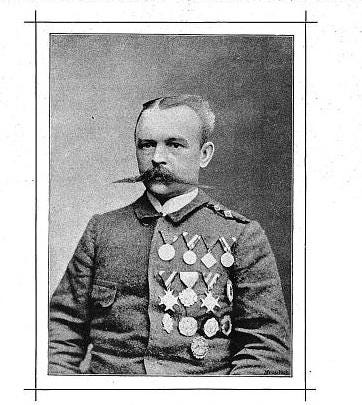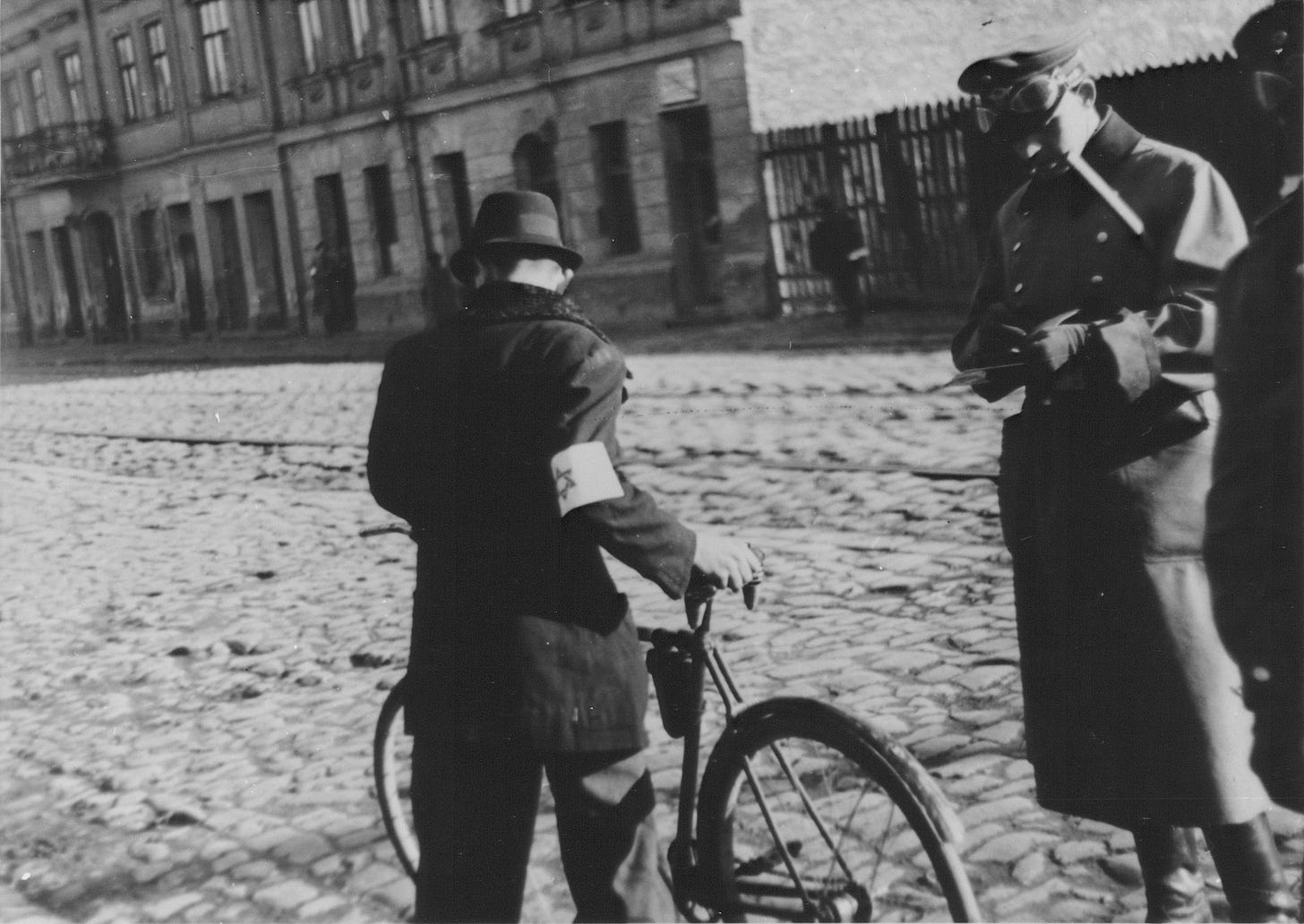Here’s the way I heard the joke as a kid:
A group of thugs approach a Jew. “Why is Germany in such bad shape?” they demand.
He knows that any answer other than “the Jews” will get him immediately punched. So he answers “the Jews…and the bicycle riders.”
“Wait, why the bicycle riders?”
“Well, why the Jews?”
I was just going to use this joke as an opener to talk more about how bigotry disguises how arbitrary it’s being, but I wanted to know how old it was, and then oops, now I’ve done a bunch of research. So you get a history post instead.
The Bicycle Backlash
Conservatives blaming Jews for everything, and progressives making fun of them for it, is an ancient German tradition. The bicycle, however, is not. The first recognizably modern bicycle showed up in 1885, and “bicycle rider” (Radfahrer) only really became a thing in the 1890s, so that’s a bound on how old this can be.
(The history of the invention of the bicycle is also interesting. I like this article about it.)
There was backlash against the bicycle, as is the way of things. Suddenly all the young hooligans were riding them, crashing into horses on their way to a dance hall instead of walking to church. Cyclists, a brand-new special interest, formed the German Bicycle Rider Union, which had many local chapters and spinoffs. Their leaders, appropriately, sported handlebar mustaches.

Their pugnacious relationship with the pedestrian public can be seen in the many, many books of “Bike Rider Humor” published in the nineties. Sample joke:
Q: Why do you bicycle riders wear such weird outfits?
A: To give stupid people something to ask questions about.
For a glorious few years, the Jews and the bicycle riders seem to have made common cause. The Bicycle Rider Union published an anti-anti-Semitic essay in volume 18 of its periodical. (I can’t find the essay online, but I believe it exists, because 18 is kabbalistically significant.) They’re creating a hostile environment for anti-Semitic cyclists, a newspaper complained, calling for the board members to be voted out. This doesn’t seem to have happened, as a few years later there’s another article complaining that one chapter displays a banner donated by someone named Goldsmith, and that another closed out a meeting by reading a poem about how sexy a Jewish cyclist is. (This one might be a lie, but I’m going to include the alleged poem anyway.)
Which I think translates roughly to
He whose sport is so well known,
Not only with the wheel alone.
Atop Pegasus he shows his skill,
Master of the ink and quill.
And when it comes to grace,
He is a true Adonais.A favorite of women young and old—
They fall in love with his dark curls,
And his fiery eyes hold power best untold.
Why can’t more people write about us the way German anti-Semites pretending to be philo-Semites do?
The next relevant clipping I could find online is from 1901. An anti-anti-Semite, Otto Ernst, writes that if a Jew makes any mistake, even dropping an umbrella or falling off a bicycle, everybody goes “look at the Jew!” Ernst goes on to describe how bigotry forms, pretty neatly:
If a Jew, or a number of Jews, behaved in a presumptuous or obtrusive manner in a public place, then the harshest reprimand did not seem harsh enough to the Germanic people present, and of course they’d soon say "Look at the Jews!" If Germanic guests in an inn behaved rudely, they might say “Look at the scoundrels!” but they’d never say “Look at the Germanics!”
…
This leads to hasty generalizations, because the Jews are all recognizable by their typical physical characteristics, and by their names, and therefore immediately attract attention. Berlin has around 60,000 Jews. If 60,000 Germanic Berliners were forced to hang signs on their chests, a growing indignation against these people would soon develop. Not only would people say, all the time, “There's another sign-man walking around,” but, if one of these unfortunates acted arrogantly, “This cheeky sign-man!” or, if one of them seduced a girl, “This wicked sign-man!”
Stage 1: Old Man Yells At Cloud
By 1912, bicycles were enough of a fact of life that it was only the really stubborn old reactionaries who complained about them…the same people who were stereotypically anti-Semitic. So the two beliefs get mockingly linked. The 1912 novel Morgenrot (Red Dawn) describes a bitter dude who’s decided that all of his problems are the fault of “the Jews and the bicycle-riders.”
This seems to have become a running joke among the left in general. A 1924 issue of the leftist magazine Die Schaubühne uses the phrase without explanation, so it looks like by then their readers could all fill in the blanks. They’re writing about France conspiracy theories, rather than anti-Semitism.
It goes without saying that the French are to blame for the German birth rate decline. What are they not to blame for? Them, the Jews, and the bicycle-riders.
In hindsight, a Nazi-era source says, this was Tödlicher Leichtsinn. Deadly frivolity.
Stage 2: And Then Everybody Clapped
As Hitler and other Nazi politicians start touring and making speeches, you start seeing anecdotes of people heckling them with this line. Now it goes like this:
Speaker: The Jews are to blame!
Heckler: …and the bicycle-riders!
Speaker: Why the bicycle riders?
Heckler: Why the Jews?
I’m torn between two different ways of interpreting these stories. Like, they’re probably made up, as an evolution of the older joke? But maybe not. Could be that this started with a leftist heckler just yelling “and the bicycle-riders,” incorrectly assuming that everybody would get the reference. Then, the confused Nazi, who doesn’t read Die Schaubühne, asks the question, and the heckler, put on the spot, gives what, to them, is the obvious retort.1
It takes a bit, but eventually someone (supposedly) tries this on Hitler, in one of the last years where you could heckle him and live. The story appears in English, in a 1931 issue of The National Jewish Monthly, as part of a long piece describing his final, successful, campaign. This is allegedly his one failure. He’s off his game, speaking indoors but while drenched, having been caught in heavy rain on his way over. He makes the mistake of asking an open-ended rhetorical question to a not-particularly-sympathetic audience.
Hitler: And who is behind all of these evils?
crickets
Hitler: The Jews!
Heckler, deadpan: And the bicycle riders.
Hitler, not deadpan: WHY THE BICYCLE RIDERS?
Heckler, still deadpan: Why the Jews?
The room erupts in laughter, and Hitler never recovers. He tries to pivot to talking about how the Communists and Wall Street are secretly conspiring to tank the world’s economy, but people keep giggling. In future speeches, our reporter notes, he’s careful to avoid any line that sounds like it’s inviting audience participation, especially when he’s talking about Jews.
Stage 3: Cyclical Revival
After the war, it’s always framed as a joke, not a true story. The speaker is usually Hitler, and the idea of blaming “the bicycle riders” seems totally random.
It’s different, after the battle’s lost and won. The basic idea of the joke involves showing a mirror to the bigots—here’s what you sound like when you pick on one arbitrary group. But now people could just say “you sound like a Nazi.” So now the joke’s not so much making a point as indulging a fantasy, like the cartoons where Bugs Bunny, with a gun muzzle in his face, uses deadpan quips to confuse the hunter into turning the gun on himself.
Today’s society, though, has mostly decided that “you sound like a Nazi” is OP and needs to be nerfed. Many insist that it’s disrespectful to compare anything to the Holocaust—you’re not allowed to learn any lesson from it other than “the Holocaust was bad.” The internet right, at least until recently, was forever invoking “Godwin’s law,” the rule that since any internet argument eventually ends in a specious Nazi comparison, we should treat that analogy like a concession. Godwin himself (no apparent relation to the Godwin this blog is obsessed with) has clarified that he doesn’t consider the law to apply to U.S. politics at the moment, since Nazi comparisons are no longer specious. But the impact is still blunted.
I’ve occasionally tried to modernize the bicycle joke when arguing about immigration. “I’ve discovered an old law that’s still on the books banning all blue cars,” I lied in a blog comment once. “Deadly accidents involving blue cars kill an estimated 4,500 people a year,” I continued, truthfully. “If only we enforced the law, those people would have been saved.”
I’m not sure this works any better than that 1901 editorial about making random people wear signs did. If you’re already bigoted, it doesn’t feel arbitrary. A statistic about the number of car accidents caused by visa-overstayers feels meaningful, while the same statistic about blue cars is correctly perceived as meaningless, so clearly they’re not analogous! Otherwise, they wouldn’t feel so different.
My hope, the one that keeps me trying this stuff, is that reaching people in the tiny intersection of “passionately bigoted” and “sincerely wants to be rational and altruistic” is still possible, and useful. These are the people who think they can’t trust the media, because they don’t call out “illegals” whenever they fall off a bicycle. Their votes are not going to swing the election, but they do probably affect the discourse. Harris/Trump is a tossup. Nothing is inevitable yet.
So, what the heck. Here’s a true story I just made up:
A guy in a red cap was holding forth about how we need Trump to keep us safe.
MAGA: And did you see the news about the terrible shooting yesterday? The media won’t tell you this, but the shooter—
Bystander: Yes, I read about this! The shooter had unpaid parking tickets! If only we had a policy of locking up everyone who gets a parking ticket, the tragedy could’ve been averted!
MAGA: That’s stupid. Everybody does stuff like that. Government is too bloated and keeps all these nonsense rules around that make everything take forever. Like, if I hadn’t jaywalked on my way here—
Bystander: (gasps) You’re here illegally?!

Ed: I’m leaving this tortured sentence structure as-is, as a warning about the dangers of reading too much German while writing in English.







Just started reading, but have to say: for an interesting look on how bicycles changed women's rights and privileges, take a look at (what else) a great kids' book about it. Wheels of Change by Sue Macy. https://penguinrandomhouselibrary.com/book/?isbn=9781426307614